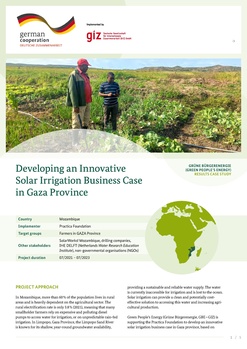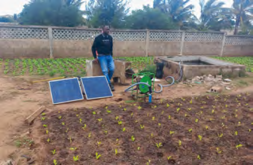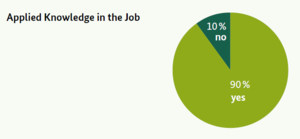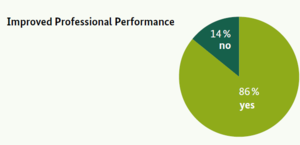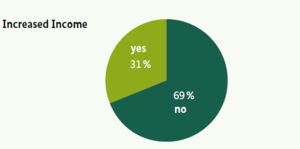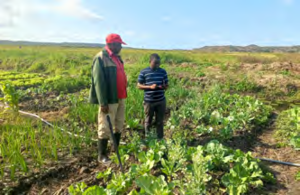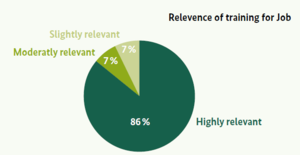Developing an Innovative Solar Irrigation Business Case in Gaza Province
Developing an Innovative Solar Irrigation Business Case in Gaza Province
Project Approach
In Mozambique, more than 60 % of the population lives in rural areas and is heavily dependent on the agricultural sector. The rural electrification rate is only 3.8 % (2021), meaning that many smallholder farmers rely on expensive and polluting diesel pumps to access water for irrigation, or on unpredictable rain-fed irrigation. In Limpopo, Gaza Province, the Limpopo Sand River is known for its shallow, year-round groundwater availability, providing a sustainable and reliable water supply. The water is currently inaccessible for irrigation and is lost to the ocean. Solar irrigation can provide a clean and potentially costeffective solution to accessing this water and increasing agricultural production. Green People’s Energy (Grüne Bürgerenergie, GBE – GIZ) is supporting the Practica Foundation to develop an innovative solar irrigation business case in Gaza province, based on previous experience. Practica has developed a technique that allows local enterprises to install affordable well points for individual farmers. By connecting the well point to a low-cost irrigation system (including a small solar pump) the water from the wells can be used for farming activities. In order to make this a functioning overall concept, the project approach includes various activities: Selection of Mozambique-based partners interested in offering integrated pump and irrigation solutions, planning and stakeholder involvement, training and equipment delivery for selected local drilling teams, familiarizing farmers with the Pay As You Go (PAYGO) approach (see explanation below), monitoring and planning for upscaling. A crucial part of the project are various capacity building measures. Together with the solar equipment supplier SolarWorks! Mozambique, Practica trains the farmers who purchase the solar-powered irrigation systems (SPIS). Practica also trains local drill enterprises, solar pump supplier technicians, extension workers and teachers of educational institutes.The plan is that 100 farmers purchase SPIS while receiving subsidies from GIZ. In order to test the demand and willingness to pay of the potential clients, the concept foresees the reduction of subsidy level: early birds receive 70 % subsidy, while the second half could only count with 50 % subsidy. Entering a new market, this allows to provide a special incentive for the first clients. The farmers pay their own contributions on a PAYGO basis for a 24-months contract period. This means that farmers do not have to go into debt, but can gradually pay off their SPIS in instalments (e.g. after they have been able to generate money through crop sales).
Methodology of Data Collection
The data for this case study report was collected through a project document review, five qualitative interviews with representatives of GIZ, Practica, SolarWorks! Mozambique and two farmers, as well as and a quantitative survey among 50 training participants, 29 of whom responded (of which 24 % are women). In addition, the project monitors the financial impacts on the famers by IHE DELFT (Netherlands Water Research Education Institute). There were several rounds: an intake survey, continuous field visits throughout the cropping season, a final survey at the end of the first season and a more detailed evaluation of the profits with a limited number of surveyed farmers (8) over the full last season (2022). In addition, Practica conducted an impact assessment survey with 31 farmers (23 % of whom were women). Results of all surveys are presented below. The case study was conducted between March and August 2023.
Key Findings
Project Achievements
In total, 111 people were trained in different topics, including: agriculture, SPIS, drilling techniques and related topics. Of these, 50 were selected to take part in the survey, including 21 technicians trained in SPIS, 7 in drilling, and 22 extension workers and teachers trained in agriculture. The drilling companies have also been successfully equipped. 90 % of the training participants report in the survey that they are using the training knowledge they acquired in their respective jobs (see figure 1). The application of learned knowledge is also reflected in improved work performance (see figure 2). This gives reason to believe that the trainings were valuable in contributing to good quality installations, including the installations of the subsidised SPIS. 100 farmers have taken advantage of the incentives offered and are using the installed SPIS with maximum power of 360 W.Of these, 50 purchased a SPIS with 70 % incentive vouchers and the remaining 50 bought the SPIS with 50 % incentive. All the farmers were trained on the use of the systems. According to interview partners the provision of the SPIS has been a game-changer for the crop production. Thanks to this innovative solution, farmers no longer have to rely on the tedious and time-consuming task of manually irrigating their crops using a can or bucket. The SPIS have saved farmers many hours of work and extended the scope of crop cultivation beyond what was previously possible. Thanks to the irrigation systems, horticulture crops such as bananas, papaya, and vegetables can now be easily cultivated. Producers have started to focus on short-cycle vegetable crops like lettuce, cabbage, kale, etc., which require more frequent watering. Some crops require daily irrigation, or even twice a day during the sunny season. Apart from increased crop diversity, farmers can now also grow crops year-round, even during the hot and dry seasons. A Practica report reveals that 68 % of farmers use their SPIS frequently.
A financial evaluation of a full season was not possible, since the solar pump was introduced mid-way or in some cases at the end of the 2022 season. However, fuel costs still covered 14 % of the seasonal input costs, indicating the significant contribution a solar pump can make to reducing the running costs of the farm. Most farmers in the study make an average profit of approximately € 1,050 over a dry season, with significant variation (between € 50 and € 3,000). The most profitable farm specialized in cash crops, while the least profitable focused on subsistence farming. The majority likely falls into the middle category with diversified crops for income and own consumption. In terms of payment the supplier offered flexible instalment options. Most farmers chose to make payments every 3 months (27 %) or 6 months (53 %), with amounts typically ranging between € 44 – 74 or € 74 –148, respectively. Initially, the first instalment was often covered from personal savings, followed by income from existing farm activities, while subsequent payments mainly relied on farming income (88 %).
Intermediate Impact
Overall, the SPIS have been essential for enhancing agricultural productivity. Thanks to the systems, farmers can now focus on other aspects of their work, such as pest control and soil management, instead of time-consuming manual irrigation. Those who previously relied on generators for their irrigation needs, benefit from significant cost savings. It enabled them to reduce production costs related to fuel powered pumps. Fuel is quite expensive and it is time-consuming to buy it on a regular basis. By replacing the use of generators with a more efficient and cost-effective system, farmers are able to reduce their expenses and increase their overall profitability. This switch has not only benefited farmers financially, but has also had a positive impact on the environment by reducing carbon emissions. Interviewed end-users stated that the SPIS is leading to improved overall well-being for themselves and their families. With the ability to grow a wide range of vegetables, they can provide their families with a more balanced and healthier diet. Moreover, the income from the sale of these crops has helped an interviewee’s family to meet basic needs such as health care and education for their children. At the time of the Case Study, comprehensive quantitative data on the effect on farmer income was not yet available. However, statements from the qualitative interviews suggest that the installation of SPIS has improved reliable access to water and the quality of life of farming families.Although the training for technicians, drilling companies, extension workers and teachers of educational institutions was primarily aimed at improving the quality of installations, participants noted improved professional qualification as an individual benefit. Based on the findings of the survey, it has been revealed that 31 % of trainees reported an increase in their income due to improved professional qualification (figure 3).
Climate Impacts
Following the calculation methodology of the United Nations Framework Convention on Climate Change (UNFCCC), the installations described above are estimated to mitigate 47,26 t CO2 e/a in the year of installation by avoiding and/or replacing the use of fossil fuels. This is roughly equivalent to the annual CO2 emissions of more than 33 medium-sized cars in Germany.
Challenges in Project Implementation
A major challenge was the issue of frequent rains that hit the Gaza province in the rainy season 2022 – 2023. Due to cyclones and floods in February 2023, many farmers were compelled to move away from the river, resulting in a significant loss of potential customers for supply companies. Another project challenge referred to the transportation to the farming training site because it was relatively far from the farmers’ homes, and the roads were difficult to navigate. This made access to the training site difficult for both the farmers and the suppliers who had to transport goods to and from the training site. 32 % of the farmers surveyed by Practica did not experience any challenges. The remaining 68 %, mentioned a variety of challenges:
Problems with regard to the irregular solar radiation, as the solar pumps do not have batteries; filtering problems that cause dirt to reach the pump and damage it; too short pipework considering the size of the production field and problems with the windings.
Due to some of the challenges mentioned before, 13 % of the surveyed farmers have encountered breakdowns of their pumps and are still waiting for a solution despite contacting the supplier. Due to the floods, 19 % of those farmers who purchased a SPIS and were surveyed have made only limited use of it seven months after the floods, as the land was still flooded or wet. Finally, it should be noted that in some cases the financial incentive offered by the project stimulated social envy, because despite of the subsidy poor farmers still cannot afford a SPIS.
Lessons Learned
Given the recent conclusion of the project, it was possible to detect that some SPISs had malfunctions, even though they had been reported to the supplier for proper maintenance. Several factors contribute to this situation, which creates the opportunity for a more comprehensive investigation in the future. It is worth considering whether to adopt an alternative pump model or to implement modifications to the pump, such as protective measures against dust damage, in order to prevent damage to these systems.For training purposes, it was helpful to have both optimal and less optimal systems available in the demonstration field to explain, demonstrate and discuss the appropriateness of the application technologies with the solar pumps. Furthermore, the trained technicians had good empirical and practical knowledge of the maintenance and installation of solar pumps and irrigation systems before the training. However, they did not have the basic knowledge of hydraulics to understand concepts such as head pressure and friction losses. In this area, the training has offered particular added value, which will enable them to select and install the systems in the future.
Monitoring farmers’ cash flows and crop production is challenging due to the varied and staggered nature of irrigation-driven cultivation, leading to irregular harvests and continuous farm gate sales throughout the season. Effective evaluation results require monitoring farm operations for a minimum of 2 – 3 full seasons, particularly when the pump supply starts midway or late in the irrigation season.
Sustainability of the Intervention
The positive impact on the capacity of the trained stakeholders (see project achievements, figure 2) suggests that they will be able to apply the knowledge they have acquired in the long term. Furthermore, the company SolarWorks! Mozambique has provided a two-years warranty that includes maintenance support. This means that the end-users of the SPIS should receive support from the supplier, when problems with the equipment occur. In addition to this, farmers have been advised in the training to set aside some funds for potential repairs or replacements once the warranty period has ended. With the funds available, famers would be prepared for possible eventualities and could continue to use their equipment as often as possible without interruption. Furthermore, the end-users also received a maintenance training to promote sustainability as they take responsibility for the upkeep of their equipment.
Conclusion and Outlook
The project has addressed a major problem for farmers in Gaza Province. In the Practica survey, about 81 % of respondents said that the use of solar pumps is (very) important to them. By providing improved access to water for agriculture, the project has had a positive impact on the lives of farmers and their families, particularly in terms of income and nutrition. The capacity building measures were an important success factor and adapted to the needs of the target group. The vast majority of 86 % of survey participants, perceive the training to be highly relevant (see Figure 4).The project has shown that farmers are interested in SPIS. According to the survey data from Practica 80 % of the farmers who purchased a SPIS recommended it to other farmers. Furthermore, the fact that only one of the farmers interviewed who received a 70 % subsidy found the procurement costs a challenge suggests that for those who received the subsidy, providing their own contribution was not a major problem.
The project proved that solar equipment suppliers can sell those systems through a PAYGO solution and that farmers are willing and able to invest in solar irrigation systems. The project could therefore be replicated at other sites along the Limpopo and similar rivers.
The project has been integrated into a larger process of researching the SPIS potential in the Gaza region. Before starting this intervention, Practica did a market study about the area after having analyzed the client potential of 30,000 farmers in Gaza alone that could profit from a SPIS. After having tested their business model, the company SolarWorks! plans to sell further SPIS in the area, financially supported by the RBF fund FASER (during the last call of proposals, support for 300 systems were requested). Practica foresees the continuation of the support from technical side to continue analyses the data from the farmers who use SPIS to irrigate their fields.

